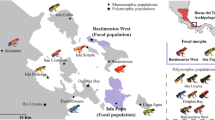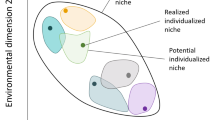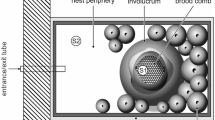Abstract
Mating behaviors are sensitive to novel or stressful thermal conditions, particularly for ectothermic organisms. An organism’s sensitivity to temperature, which may manifest in altered mating outcomes, can be shaped in part by temperatures experienced during development. Here, we tested how developmental temperature shapes the expression of adult mating-related behaviors across different ambient conditions, with a focus on courtship behavior, mating rates, and mating signals and preferences. To do so, we reared treehoppers under two temperature regimes and then tested the expression of male and female mating behaviors across a range of ambient temperatures. We found that developmental temperature affects the thermal sensitivity of courtship behavior and mating signals for males. However, developmental temperature did not affect the thermal sensitivity of courtship or mate preferences in females. This sex-specific plasticity did not alter the likelihood of mating across ambient temperatures, but it did disrupt how closely mating signals and preferences matched each other at higher ambient temperatures. As a result, developmental temperature could alter sexual selection through signal–preference de-coupling. We further discuss how adult age may drive sex-specific results, and the potential for mismatches between developmental and mating thermal environments under future climate change predictions.




Similar content being viewed by others
Availability of data and materials
The datasets and code generated for this study are available at Dryad. Doi: https://doi.org/10.5061/dryad.zkh1893ch.
References
Abram PK, Boivin G, Moiroux J, Brodeur J (2017) Behavioural effects of temperature on ectothermic animals: unifying thermal physiology and behavioural plasticity. Biol Rev 92(4):1859–1876. https://doi.org/10.1111/brv.12312
Araripe LO, Klaczko LB, Moreteau B, David JR (2004) Male sterility thresholds in a tropical cosmopolitan drosophilid, Zaprionus indianus. J Therm Biol 29(2):73–80. https://doi.org/10.1016/j.jtherbio.2003.11.006
Balmer AJ, Brakefield PM, Brattström O, van Bergen E (2018) Developmental plasticity for male secondary sexual traits in a group of polyphenic tropical butterflies. Oikos 127(12):1812–1821. https://doi.org/10.1111/oik.05291
Bates D, Mächler M, Bolker B, Walker S (2015) Fitting linear mixed-effects models using lme4. J Stat Softw 67:1–48. https://doi.org/10.18637/jss.v067.i01
Beaupre SJ, Duvall DJ (1998) Integrative biology of rattlesnakes: contributions to biology and evolution. Bioscience 48(7):531–538. https://doi.org/10.2307/1313315
Beckers OM, Schul J (2008) Developmental plasticity of mating calls enables acoustic communication in diverse environments. Proc R Soc B 275(1640):1243–1248. https://doi.org/10.1098/rspb.2007.1765
Brandt EE, Kelley JP, Elias DO (2018) Temperature alters multimodal signaling and mating success in an ectotherm. Behav Ecol Sociobiol 72(12):191. https://doi.org/10.1007/s00265-018-2620-5
Breheny P, Burchett W (2017) Visualization of regression models using visreg. R J 9(2):56–71
Brown GP, Weatherhead PJ (2000) thermal ecology and sexual size dimorphism in northern water snakes, Nerodia Sipedon. Ecol Monog 70(2):311–330. https://doi.org/10.1890/0012-9615(2000)070[0311:TEASSD]2.0.CO;2
Caillon R, Suppo C, Casas J, Arthur Woods H, Pincebourde S (2014) Warming decreases thermal heterogeneity of leaf surfaces: Implications for behavioural thermoregulation by arthropods. Funct Ecol 28(6):1449–1458. https://doi.org/10.1111/1365-2435.12288
Chaine AS, Lyon BE (2008) Adaptive plasticity in female mate choice dampens sexual selection on male ornaments in the lark bunting. Science 319(5862):459–462. https://doi.org/10.1126/science.1149167
Chen Z-Z, Xu L-X, Li L-L, Wu H-B, Xu Y-Y (2019) Effects of constant and fluctuating temperature on the development of the oriental fruit moth, Grapholita molesta (Lepidoptera: Tortricidae). Bull Entomol Res 109(2):212–220. https://doi.org/10.1017/S0007485318000469
Cocroft RB, Rodríguez RL, Hunt RE (2008) Host Shifts, the Evolution of Communication, and Speciation in the Enchenopa binotata Species Complex of Treehoppers. University of California Press. https://doi.org/10.1525/california/9780520251328.003.0007
Cocroft RB, Rodríguez RL, Hunt RE (2010) Host shifts and signal divergence: mating signals covary with host use in a complex of specialized plant-feeding insects. Biol J Lin Soc 99(1):60–72. https://doi.org/10.1111/j.1095-8312.2009.01345.x
Cui J, Zhu S, Bi R, Xu W, Gao Y, Shi S (2018) Effect of temperature on the development, survival, and fecundity of Heliothis viriplaca (Lepidoptera: Noctuidae). J Econ Entomol 111(4):1940–1946. https://doi.org/10.1093/jee/toy151
Darnell MZ, Fowler KK, Munguia P (2013) Sex-specific thermal constraints on fiddler crab behavior. Behav Ecol 24(4):997–1003. https://doi.org/10.1093/beheco/art006
David JR, Araripe LO, Chakir M, Legout H, Lemos B, Pétavy G, Rohmer C, Joly D, Moreteau B (2005) Male sterility at extreme temperatures: a significant but neglected phenomenon for understanding Drosophila climatic adaptations. J Evol Biol 18(4):838–846. https://doi.org/10.1111/j.1420-9101.2005.00914.x
Easterling DR, Horton B, Jones PD, Peterson TC, Karl TR, Parker DE, Salinger MJ, Razuvayev V, Plummer N, Jamason P, Folland CK (1997) Maximum and minimum temperature trends for the globe. Science. https://doi.org/10.1126/science.277.5324.364
Foley HB, Sun PY, Ramirez R, So BK, Venkataraman YR, Nixon EN, Davies KJA, Edmands S (2019) Sex-specific stress tolerance, proteolysis, and lifespan in the invertebrate Tigriopus californicus. Exp Gerontol 119:146–156. https://doi.org/10.1016/j.exger.2019.02.006
Fowler-Finn KD, Rodríguez RL (2012) Experience-mediated plasticity in mate preferences: mating assurance in a variable environment. Evolution 66(2):459–468. https://doi.org/10.1111/j.1558-5646.2011.01446.x
Fowler-Finn KD, Rodríguez RL (2016) The causes of variation in the presence of genetic covariance between sexual traits and preferences. Biol Rev 91(2):498–510. https://doi.org/10.1111/brv.12182
Fowler-Finn KD, Kilmer JT, Hallett AC, Rodríguez RL (2015) Variation in signal–preference genetic correlations in Enchenopa treehoppers (Hemiptera: Membracidae). Ecol Evol 5(14):2774–2786. https://doi.org/10.1002/ece3.1567
Fowler-Finn KD, Cruz DC, Rodríguez RL (2017) Local population density and group composition influence the signal–preference relationship in Enchenopa treehoppers (Hemiptera: Membracidae). J Evol Biol 30(1):13–25. https://doi.org/10.1111/jeb.12994
Fowler-Finn KD, Al-Wathiqui N, Cruz D, Al-Wathiqui M, Rodríguez RL (2014) Male Enchenopa treehoppers (Hemiptera: Membracidae) vary mate-searching behavior but not signaling behavior in response to spider silk. https://pubag.nal.usda.gov/catalog/245353
Frommen JG, Thünken T, Santostefano F, Balzarini V, Hettyey A (2022) Effects of chronic and acute predation risk on sexual ornamentation and mating preferences. Behav Ecol 33(1):7–16. https://doi.org/10.1093/beheco/arab116
García-Roa R, Garcia-Gonzalez F, Noble DWA, Carazo P (2020) Temperature as a modulator of sexual selection. Biol Rev 95(6):1607–1629. https://doi.org/10.1111/brv.12632
Gillespie SR, Scarlett Tudor M, Moore AJ, Miller CW (2014) Sexual selection is influenced by both developmental and adult environments. Evolution 68(12):3421–3432. https://doi.org/10.1111/evo.12526
González-Tokman D, Córdoba-Aguilar A, Dáttilo W, Lira-Noriega A, Sánchez-Guillén RA, Villalobos F (2020) Insect responses to heat: physiological mechanisms, evolution and ecological implications in a warming world. Biol Rev 95(3):802–821. https://doi.org/10.1111/brv.12588
Grace JL, Shaw KL (2004) Effects of developmental environment on signal–preference coupling in a hawaiian cricket. Evolution 58(7):1627–1633. https://doi.org/10.1111/j.0014-3820.2004.tb01744.x
Greenfield MD, Medlock C (2007) Temperature coupling as an emergent property: parallel thermal effects on male song and female response do not contribute to species recognition in an acoustic moth. Evolution 61(7):1590–1599. https://doi.org/10.1111/j.1558-5646.2007.00140.x
Grimaldi D, Engel MS, Engel MS, Engel SC (2005) Evolution of the Insects. Cambridge University Press
Huey RB, Stevenson RD (1979) Integrating thermal physiology and ecology of ectotherms: a discussion of approaches. Integr Comp Biol 19(1):357–366. https://doi.org/10.1093/icb/19.1.357
Iossa G, Maury C, Fletcher RM, Eady PE (2019) Temperature-induced developmental plasticity in Plodia interpunctella: reproductive behaviour and sperm length. J Evol Biol 32(7):675–682. https://doi.org/10.1111/jeb.13447
Jocson DMI, Smeester ME, Leith NT, Macchiano A, Fowler-Finn KD (2019) Temperature coupling of mate attraction signals and female mate preferences in four populations of Enchenopa treehopper (Hemiptera: Membracidae). J Evol Biol 32(10):1046–1056. https://doi.org/10.1111/jeb.13506
Kilmer JT, Fowler-Finn KD, Gray DA, Höbel G, Rebar D, Reichert MS, Rodríguez RL (2017) Describing mate preference functions and other function-valued traits. J Evol Biol 30(9):1658–1673. https://doi.org/10.1111/jeb.13122
Kingsolver JG, Huey RB (2008) Size, temperature, and fitness: three rules. Evol Ecol Res 10:251–268
Klepsatel P, Girish TN, Dircksen H, Gáliková M (2019) Reproductive fitness of Drosophila is maximised by optimal developmental temperature. J Exp Biol. https://doi.org/10.1242/jeb.202184
Kuznetsova A, Brockhoff PB, Christensen RHB (2017) lmerTest package: tests in linear mixed effects models. J Stat Softw 82:1–26. https://doi.org/10.18637/jss.v082.i13
Leith NT, Jocson DI, Fowler-Finn KD (2020) Temperature-related breakdowns in the coordination of mating in Enchenopa binotata treehoppers (Hemiptera: Membracidae). Ethology 126(9):870–882. https://doi.org/10.1111/eth.13033
Leith NT, Macchiano A, Moore MP, Fowler-Finn KD (2021) Temperature impacts all behavioral interactions during insect and arachnid reproduction. Curr Opin Insect Sci 45:106–114. https://doi.org/10.1016/j.cois.2021.03.005
Leith NT, Fowler-Finn KD, Moore MP (2022) Evolutionary interactions between thermal ecology and sexual selection. Ecol Lett 25(9):1919–1936. https://doi.org/10.1111/ele.14072
Lis C, Moore MP, Martin RA (2020) Warm developmental temperatures induce non-adaptive plasticity in the intrasexually selected colouration of a dragonfly. Ecol Entomol 45(3):663–670. https://doi.org/10.1111/een.12839
Ma L, Wang X, Liu Y, Su M-Z, Huang G-H (2017) Temperature effects on development and fecundity of Brachmia macroscopa (Lepidoptera: Gelechiidae). PLoS ONE 12(3):e0173065. https://doi.org/10.1371/journal.pone.0173065
Macchiano A, Sasson DA, Leith NT, Fowler-Finn KD (2019) Patterns of thermal sensitivity and sex-specificity of courtship behavior differs between two sympatric species of enchenopa treehopper. Front Ecol Evol. https://doi.org/10.3389/fevo.2019.00361
Moore MP, Hersch K, Sricharoen C, Lee S, Reice C, Rice P, Kronick S, Medley KA, Fowler-Finn KD (2021) Sex-specific ornament evolution is a consistent feature of climatic adaptation across space and time in dragonflies. Proc Nat Acad Sci USA 118(28):e2101458118. https://doi.org/10.1073/pnas.2101458118
Niemelä PT, Niehoff PP, Gasparini C, Dingemanse NJ, Tuni C (2019) Crickets become behaviourally more stable when raised under higher temperatures. Behav Ecol Sociobiol. https://doi.org/10.1007/s00265-019-2689-5
Nijhout HF (2003) Development and evolution of adaptive polyphenisms. Evol Dev 5(1):9–18. https://doi.org/10.1046/j.1525-142X.2003.03003.x
NOAA (National Oceanic and Atmospheric Administration). 2022. National Centers for Environmental Information. Accessed Jan 2022. www.ncei.noaa.gov
Oliver ECJ, Donat MG, Burrows MT, Moore PJ, Smale DA, Alexander LV, Benthuysen JA, Feng M, Sen Gupta A, Hobday AJ, Holbrook NJ, Perkins-Kirkpatrick SE, Scannell HA, Straub SC, Wernberg T (2018) Longer and more frequent marine heatwaves over the past century. Nat Commun 9(1):1324. https://doi.org/10.1038/s41467-018-03732-9
Parrett JM, Knell RJ (2018) The effect of sexual selection on adaptation and extinction under increasing temperatures. Proc R Soc B 285(1877):20180303. https://doi.org/10.1098/rspb.2018.0303
Pilakouta N, Baillet A (2022) Effects of temperature on mating behaviour and mating success: a meta-analysis. J Anim Ecol 91(8):1642–1650. https://doi.org/10.1111/1365-2656.13761
Pincebourde S, Woods HA (2020) There is plenty of room at the bottom: microclimates drive insect vulnerability to climate change. Curr Opin Insect Sci 41:63–70. https://doi.org/10.1016/j.cois.2020.07.001
Prudic KL, Jeon C, Cao H, Monteiro A (2011) Developmental plasticity in sexual roles of butterfly species drives mutual sexual ornamentation. Science 331(6013):73–75. https://doi.org/10.1126/science.1197114
Revelle W (2022) Psych: procedures for psychological, psychometric, and personality research. Northwestern University, Cham
Rodríguez RL, Cocroft RB (2006) Divergence in female duetting signals in the Enchenopa binotata species complex of treehoppers (Hemiptera: Membracidae). Ethology 112(12):1231–1238. https://doi.org/10.1111/j.1439-0310.2006.01285.x
Rodríguez RL, Ramaswamy K, Cocroft RB (2006) Evidence that female preferences have shaped male signal evolution in a clade of specialized plant-feeding insects. Proc R Soc B 273(1601):2585–2593. https://doi.org/10.1098/rspb.2006.3635
Rodríguez RL, Haen C, Cocroft RB, Fowler-Finn KD (2012) Males adjust signaling effort based on female mate-preference cues. Behav Ecol 23(6):1218–1225. https://doi.org/10.1093/beheco/ars105
Rohr JR, Raffel TR (2010) Linking global climate and temperature variability to widespread amphibian declines putatively caused by disease. Proc Natl Acad Sci 107(18):8269–8274. https://doi.org/10.1073/pnas.0912883107
Rosenthal MF, Elias DO (2019) Nonlinear changes in selection on a mating display across a continuous thermal gradient. Proc Biol Sci 286(1907):20191450. https://doi.org/10.1098/rspb.2019.1450
Santos MA, Carromeu-Santos A, Quina AS, Santos M, Matos M, Simões P (2021) High developmental temperature leads to low reproduction despite adult temperature. J Thermal Biol 95:102794. https://doi.org/10.1016/j.jtherbio.2020.102794
Sasson D, Agali U, Brouk R, Hercules J, Kilmer J, Macchiano A, Ola-Ajose A, Fowler-Finn K (2022) The potential for the evolution of thermally sensitive courtship behaviours in the treehopper, Enchenopa binotata. J Evol Biol 35(11):1442–1454. https://doi.org/10.1111/jeb.14090
Sattman DA, Cocroft RB (2003) Phenotypic plasticity and repeatability in the mating signals of enchenopa treehoppers, with implications for reduced gene flow among host-shifted populations. Ethology 109(12):981–994. https://doi.org/10.1046/j.1439-0310.2003.00940.x
Schielzeth H (2010) Simple means to improve the interpretability of regression coefficients. Methods Ecol Evol 1(2):103–113. https://doi.org/10.1111/j.2041-210X.2010.00012.x
Simões P, Santos MA, Carromeu-Santos A, Quina AS, Santos M, Matos M (2020) Beneficial developmental acclimation in reproductive performance under cold but not heat stress. J Thermal Biol 90:102580. https://doi.org/10.1016/j.jtherbio.2020.102580
Slotsbo S, Schou MF, Kristensen TN, Loeschcke V, Sørensen JG (2016) Reversibility of developmental heat and cold plasticity is asymmetric and has long-lasting consequences for adult thermal tolerance. J Exp Biol 219(17):2726–2732. https://doi.org/10.1242/jeb.143750
Sørensen JG, Kristensen TN, Overgaard J (2016) Evolutionary and ecological patterns of thermal acclimation capacity in Drosophila: is it important for keeping up with climate change? Curr Opin Insect Sci 17:98–104. https://doi.org/10.1016/j.cois.2016.08.003
Stillwell RC, Blanckenhorn WU, Teder T, Davidowitz G, Fox CW (2010) Sex differences in phenotypic plasticity affect variation in sexual size dimorphism in insects: from physiology to evolution. Annu Rev Entomol 55:227–246
Stinchcombe JR, Kirkpatrick M (2012) Genetics and evolution of function-valued traits: understanding environmentally responsive phenotypes. Trends Ecol Evol 27(11):637–647. https://doi.org/10.1016/j.tree.2012.07.002
Sullivan-Beckers L, Cocroft RB (2010) The importance of female choice, male-male competition, and signal transmission as causes of selection on male mating signals. Evolution 64(11):3158–3171. https://doi.org/10.1111/j.1558-5646.2010.01073.x
Sutter A, Travers LM, Oku K, Delaney LK, Store JS, Price TAR, Wedell N (2019) Flexible polyandry in female flies is an adaptive response to infertile males. Behav Ecol 30(6):1715–1724. https://doi.org/10.1093/beheco/arz140
Symes LB, Rodríguez RL, Höbel G (2017) Beyond temperature coupling: Effects of temperature on ectotherm signaling and mate choice and the implications for communication in multispecies assemblages. Ecol Evol 7(15):5992–6002. https://doi.org/10.1002/ece3.3059
Vasudeva R, Deeming DC, Eady PE (2018) Larval developmental temperature and ambient temperature affect copulation duration in a seed beetle. Behaviour 155(1):69–82. https://doi.org/10.1163/1568539X-00003479
Walsh BS, Parratt SR, Hoffmann AA, Atkinson D, Snook RR, Bretman A, Price TAR (2019) The impact of climate change on fertility. Trends Ecol Evol 34(3):249–259. https://doi.org/10.1016/j.tree.2018.12.002
Walzer A, Schausberger P (2011) Sex-specific developmental plasticity of generalist and specialist predatory mites (Acari: Phytoseiidae) in response to food stress. Biol J Linnean Soc 102(3):650–660. https://doi.org/10.1111/j.1095-8312.2010.01593.x
Westerman E, Monteiro A (2016) Rearing temperature influences adult response to changes in mating status. PLoS ONE 11(2):e0146546. https://doi.org/10.1371/journal.pone.0146546
Wood TK (1980) Divergence in the enchenopa binotata say complex (Homoptera: Membracidae) effected by host plant adaptation. Evolution 34(1):147–160. https://doi.org/10.2307/2408324
Wood S (2011) Fast stable restricted maximum likelihood and marginal likelihood estimation of semiparametric generalized linear models. J R Stat Soc (b) 73(1):3–36
Wood TK, Guttman SI (1983) Enchenopa binotata complex: sympatric speciation? Science 220(4594):310–312
Zamudio KR, Huey RB, Crill WD (1995) Bigger isn’t always better: Body size, developmental and parental temperature and male territorial success in Drosophila melanogaster. Anim Behav 49(3):671–677. https://doi.org/10.1016/0003-3472(95)80200-2
Acknowledgements
We would like to thank N. T. Leith and M. P. Moore for helping with data analysis and manuscript feedback. We would also like to thank M. T. Gonzales for generating the MATLAB script for playbacks, and M. Fowler-Finn for design and construction of custom testing and rearing incubators and temperature sensors.
Funding
The work of KF-F was supported by NSF under Grant IOS-1656818.
Author information
Authors and Affiliations
Contributions
AM and KF-F designed the study. AM, EM, UA, and AO-A collected data. AM and processed and analyzed the data with contributions from KF-F. AM and KF-F were the primary authors with contributions from EM, UA, and AO-A. Funding was provided by NSF IOS-1656818 to KF-F.
Corresponding author
Ethics declarations
Conflict of interest
The authors declare that the research was conducted in the absence of any commercial or financial relationships that could be construed as a potential conflict of interest.
Ethics approval
Ethics approval was not required for this study, though institutional guidelines for the care and use of animals were followed.
Consent to participate
Not applicable.
Consent for publication
Not applicable.
Additional information
Communicated by George Heimpel.
Supplementary Information
Below is the link to the electronic supplementary material.
Rights and permissions
Springer Nature or its licensor (e.g. a society or other partner) holds exclusive rights to this article under a publishing agreement with the author(s) or other rightsholder(s); author self-archiving of the accepted manuscript version of this article is solely governed by the terms of such publishing agreement and applicable law.
About this article
Cite this article
Macchiano, A., Miller, E., Agali, U. et al. Developmental temperature alters the thermal sensitivity of courtship activity and signal–preference relationships, but not mating rates. Oecologia 202, 97–111 (2023). https://doi.org/10.1007/s00442-023-05376-z
Received:
Accepted:
Published:
Issue Date:
DOI: https://doi.org/10.1007/s00442-023-05376-z




